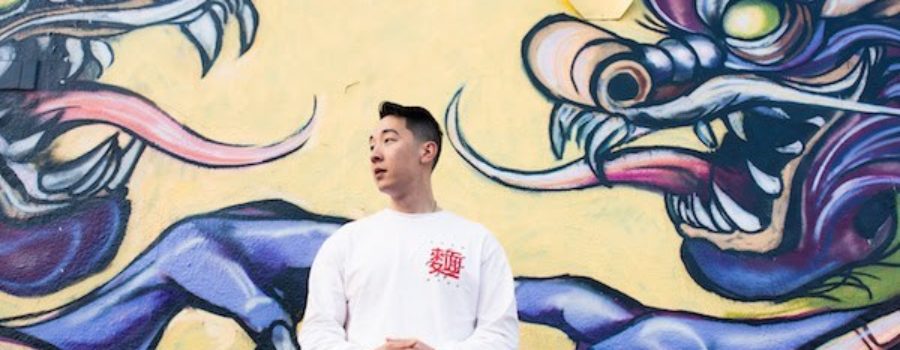As much as people praise The Beatles, hip-hop will always stand out as the overall most influential moment in music. The Liverpool foursome had some great songs. However, they don’t hold a candle to the beauty the umbrella of hip-hop covers. From the boroughs of New York City to the streets of LA to the suburban homes of America’s heartland to California’s Bay where artists like Chow Mane came up.
He may not look like your average emcee, but then again I don’t look like I could belt out every Garth Brooks record. Rooted deep in his Asian American roots, his earlier releases dove into that with finesse. Now he’s looking forward with his upcoming album, Simmering. We talked about his upbringing and how it’s shaped who he is now, hip-hop and more.
Kendra: You’ve found major inspo from the likes of Andre 3000 and the late Mac Miller, but one that is a little out of the box is Frank Zappa. What elements of Zappa’s artistry have made their way into what you do?
Chow Mane: Zappa really pushed boundaries of what people could consider music, and has done a lot of things I think are very interesting but also kind of hard to listen to. My first exposure to Zappa was through the Freak Out! album with Mothers of Invention. There are a few songs on there, and especially the last track, that have these strange, uncomfortable, surreal, and kind of dissonant moments. They weren’t just sonically weird, but the words and phrases being uttered were just bizarre.
I don’t necessarily write or approach producing music like this, but a lot of Zappa’s projects changed the way I think about music. I have a few experimental tracks I’ve done but never released, because I want to figure out ways to more seamlessly incorporate these ideas into my music. At times, sequences like these have inspired me to approach lyrics more abstractly, in like a stream-of-consciousness/word association way, reminiscent of DOOM or psychedelic-era Mac Miller.
The biggest takeaway that I’ve gotten from Zappa’s music is that anything can be good music. Sometimes I make a mistake in the studio while recording or making a song. Maybe I play a note out of the scale or I come in early. And sometimes it sounds kinda cool to just leave it like that instead of trying to redo it perfectly.
Kendra: We often get boxed in due to what people see. Most of the time white is the “norm”. For me, people consider me a Black blogger when I’m like…um, I’m just a blogger. In your case, Black is when talking about hip-hop. With that, Mooncakes helped introduce yourself to the world in a major way and on it you explored your life as an Asian in America, but you’ve noted that with Simmering – you’re ready to showcase every other aspect of who you are and not be just an Asian rapper, but a rapper. With that in mind, how did you approach the creative process with Simmering? Did you find yourself writing rhymes and editing out any homages to your Asian heritage?
Chow Mane: I wrote most of Simmering about observations, experiences, and feelings I’ve had. I didn’t actively try to avoid Asian topics. I just didn’t approach the project with Asian topics in mind like I did with Mooncakes. Being an Asian American, my experiences are seen through Asian American eyes. So I can talk about something like a Vietnamese girl in a boba shop parking lot, or a new jade piece on my chain. The only difference now is that the focus isn’t on my Asian American experience, it’s just on my experience.
Kendra: With all that said, if you had to compare Simmering to a place in your hometown where would it be and why?
Chow Mane: Simmering would be, maybe not necessarily a place in San Jose, but a sampler of the Bay Area in general. I have a few songs on there that don’t sound like anything else. I also have a few that are my twists on the Bay Area sound. Some that go stupid and some that I think are kind of beautiful. Maybe we spend a lot of time in San Jose, but we also visit Oakland, Berkeley, Fremont, Vallejo, San Francisco, and Salinas.
Kendra: You’ve said and we can hear it, but “Ever Since” pays homage to the pop beats of the ’90s. Were you a fan of that bubblegum pop that came out towards the end of the decade? Were you studying them while watching Total Request Live back in the day?
Chow Mane: I wasn’t super into them. But my dad watched a lot of music videos when I was a kid. I do remember some iconic BSB and Britney ones on rotation. Being 5-years-old when 1999 came around, I never got super into the scene. I could definitely appreciate the catchiness and songwriting whenever a song came onto the radio. The breakdown in “Ever Since” almost reminds me of a Christina Aguilera melody, and it was unintentional. The original melody at that falsetto breakdown was actually slightly different than the one that made the final version, but it was another instance of a mistake in the studio that sounded kinda cool, so we kept it.
Kendra: “Ever Since” led the pack and was followed by “Lighthouse”. Any reason those were the first two singles out of the gate?
Chow Mane: Although they don’t necessarily represent the rest of Simmering, they showcase a little more versatility. I’m gonna have some hard rap songs on the project, but that’s not all I can or want to do. I like to write melodies, and I like to create soundscapes. In the case of “Ever Since” and “Lighthouse”, I think these are catchy, unique, and well-produced enough to be good representatives of me. What these two tracks have, and what the rest of Simmering will have, is better and more cohesive songwriting that I’ve done before. I’ve grown a lot in the past year and want to show it.
Kendra: Tales of making something out of nothing are widely common in hip-hop. Listening to your music, it’s clear you’ve ridden the Struggle Bus more than not. Do you feel like those elements of your upbringing – your dad leaving, financial distress, etc. – helps you relate more to hip-hop community more so than if you were a rich kid from The OC rapping about a world you only knew from Snoop Dogg videos?
Chow Mane: My experiences growing up have given me more fuel and more emotions I can use in creating music. I didn’t grow up dirt poor, but my family and I have been through hardships. Between my parents’ divorce, their individual struggles growing up, and my own experience as one of the only Asian kids in Salinas, CA, there’s a lot I can talk about. My story is one that a lot of people can relate to. Not necessarily just Asian Americans. All people who grew up in non-ideal situations, or people who feel or felt alienated from their peers.
Kendra: As someone who lived for 1999, it’s hard to see the calendar read 2019. While I’m still in disbelief of the year, what does 2019 hold for you?
Chow Mane: I’m very excited for 2019. A lot of stuff has happened in the background over the past year. I’ve been able to meet and work with a lot of amazing people. I want to release a ton of content next year – songs, videos, more projects. I’ve made a lot of stuff this year that I’ve shelved because I didn’t feel like it was right. I’m revisiting some of it, and am hearing how different a lot of these sounds are from what’s out right now. So I’m excited to share them and to work on new content.






